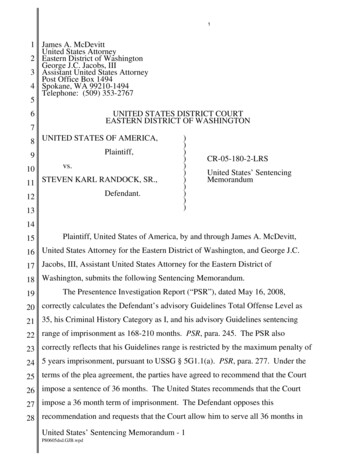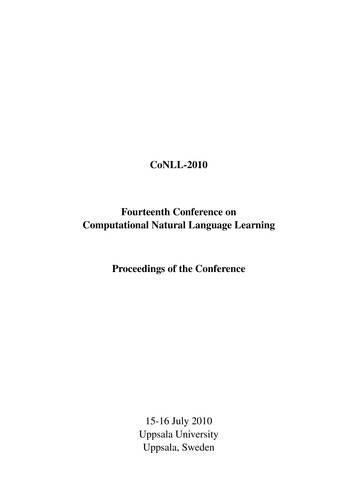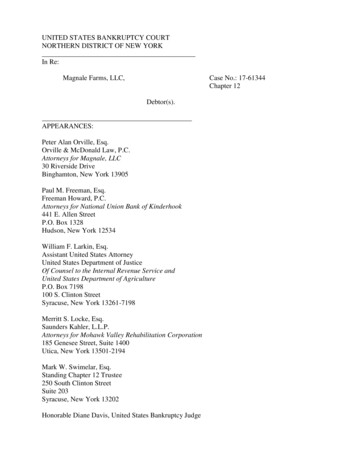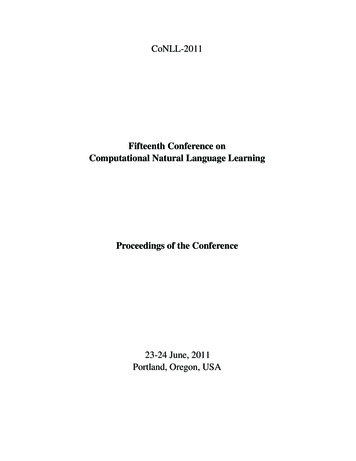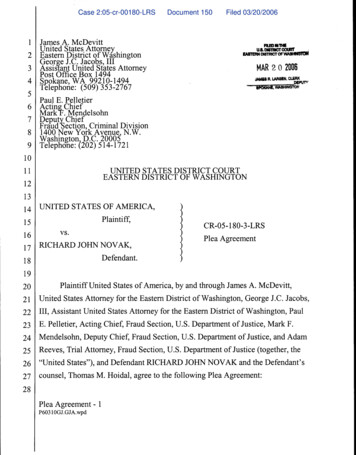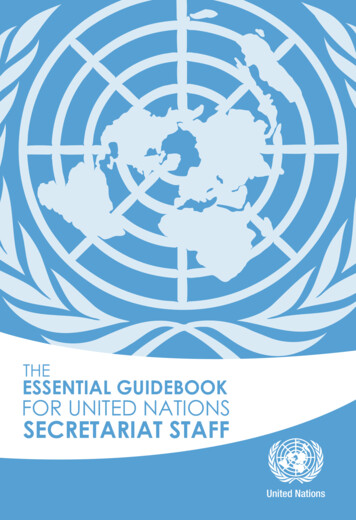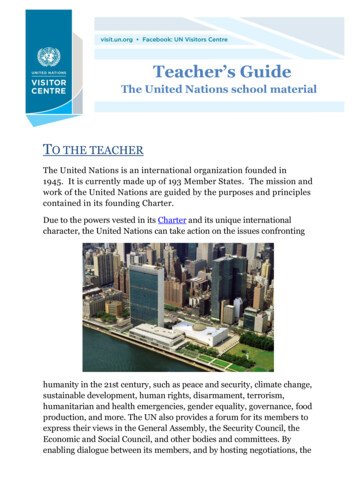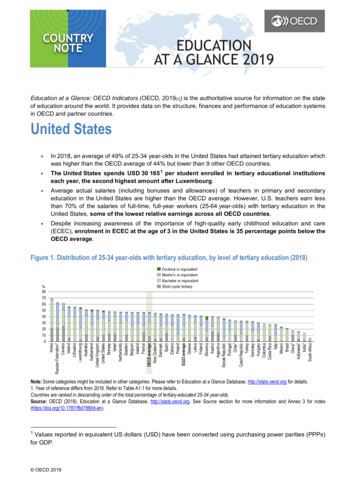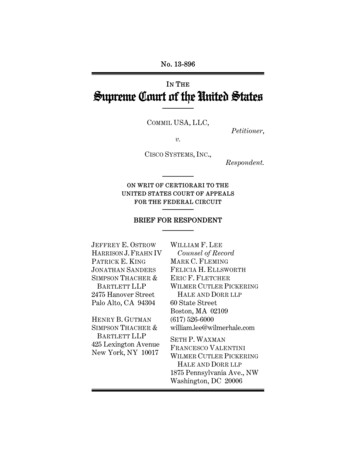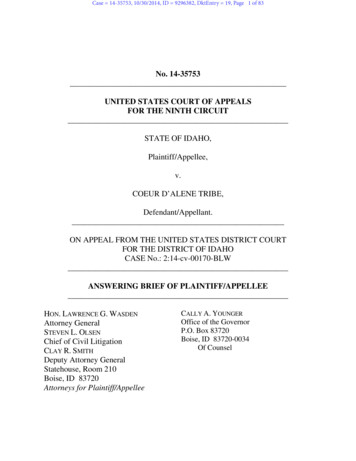
Transcription
Case 14-35753, 10/30/2014, ID 9296382, DktEntry 19, Page 1 of 83No. 14-35753UNITED STATES COURT OF APPEALSFOR THE NINTH CIRCUITSTATE OF IDAHO,Plaintiff/Appellee,v.COEUR D’ALENE TRIBE,Defendant/Appellant.ON APPEAL FROM THE UNITED STATES DISTRICT COURTFOR THE DISTRICT OF IDAHOCASE No.: 2:14-cv-00170-BLWANSWERING BRIEF OF PLAINTIFF/APPELLEEHON. LAWRENCE G. WASDENAttorney GeneralSTEVEN L. OLSENChief of Civil LitigationCLAY R. SMITHDeputy Attorney GeneralStatehouse, Room 210Boise, ID 83720Attorneys for Plaintiff/AppelleeCALLY A. YOUNGEROffice of the GovernorP.O. Box 83720Boise, ID 83720-0034Of Counsel
Case 14-35753, 10/30/2014, ID 9296382, DktEntry 19, Page 2 of 83TABLE OF CONTENTSJURISDICTIONAL STATEMENT .1I.DISTRICT COURT JURISDICTON .1II.COURT OF APPEALS JURISDICTION.1STATEMENT OF THE ISSUES.1STATEMENT OF THE CASE .2STATEMENT OF THE FACTS .4I.APPLICABLE FEDERAL AND STATE LAW .4A.Federal Law.4B.Idaho Law .6II.THE COMPACT .7III.THE POKER GAMBLING DISPUTE .10IV.DISTRICT COURT’S SEPTEMBER 2014MEMORANDUM DECISIONS .12A.Likelihood Of Success On The Merits .13B.Remaining Rule 65(a) Considerations .15STANDARD OF REVIEW .16PRELIMINARY INJUNCTION STANDARD .17SUMMARY OF THE ARGUMENT .17ARGUMENT .21i
Case 14-35753, 10/30/2014, ID 9296382, DktEntry 19, Page 3 of 83I.II.ARTICLE 21.3 UNAMBIGUOUSLY CONTEMPLATESJUDICIALPROCEEDINGSOVER ALLEGED NON-COMPLIANCE WITHTHE COMPACT .21A.FAA Standards .21B.Idaho Contract Interpretation Principles .23C.Absence Of Arbitral Exclusivity.24D.Tribe’s Failure To Request Arbitration .27THE TRIBE’S CLAIM THAT POKERCONSTITUTES CLASS II GAMING USIDAHO LAW .28A.Res Judicata Arising From The Judgment InThe Coeur d’Alene Article 6.4 LitigationPrecludes The Tribe’s Claim That PokerGaming Is Authorized Under Idaho Code .1.The Coeur d’Alene Article 6.4Litigation.29Res Judicata Applicability.31The Unambiguous Prohibition Of PokerUnder Idaho Law Has Not Fallen IntoDesuetude And Has No Exceptions .341.Idaho Law .352.Tribe’s Theories .36a.Contests of Skill Exception .36b.Merchant Promotional Games .39c.“Friends and Family” Exception .40d.Idaho Lottery Theme Games .412.B.29ii
Case 14-35753, 10/30/2014, ID 9296382, DktEntry 19, Page 4 of 833.III.IV.NIGC Classification Opinion .42THE COMPACT PROHIBITS ANY FORM OFCLASS III GAMING NOT SPECIFICALLYAUTHORIZED UNDER ARTICLE 6.2 .44THE DISTRICT COURT DID NOT ABUSE ITSDISCRETION IN CONCLUDING THAT THEREMAININGRULE65(a)FACTORSWARRANTED PRELIMINARY INJUNCTIVERELIEF.47A.Irreparable Harm .47B.Balance of Equities .49C.Public Interest .50.51STATEMENT OF RELATED CASES .51CERTIFICATE OF COMPLIANCE PURSUANT TOCIRCUIT RULE 32-1 .52CONCLUSIONiii
Case 14-35753, 10/30/2014, ID 9296382, DktEntry 19, Page 5 of 83TABLE OF CASES AND AUTHORITIESCASESAce Realty, Inc. v. Anderson, 106 Idaho 742, 682 P.2d 1289(Ct. App. 1984) .46Alliance for the Wild Rockies v. Cottrell, 632 F.3d 1127(9th Cir. 2011) .17Am. Exp. Co. v. Italian Colors Rest., 133 S. Ct. 2304 (2013) .21Artichoke Joe’s California Grand Casino v. Norton,353 F.3d 712 (9th Cir. 2003) .34Cabazon Band of Mission Indians v. Wilson, 124 F.3d 1050(9th Cir. 1997) .passimCalifornia v. Cabazon Band of Mission Indians,480 U.S. 202 (1987) .30Carroll v. MBNA Am. Bank, 148 Idaho 261, 220 P.3d 1080 (2009) .24Chan v. Soc’y Expeditions, Inc., 123 F.3d 1287 (9th Cir. 1996) .23Citizens Against Range Expansion v. Idaho Fish and Game Dep’t,153 Idaho 630, 289 P.3d 32 (2012) .37Coeur d’Alene Tribe v. Idaho, 51 F.3d 876 (9th Cir. 1995) .passimCoeur d’Alene Tribe v. Idaho, 516 U.S. 916 (1995) .10Coeur d’Alene Tribe v. Idaho, 842 F. Supp. 1268 (D. Idaho 1994) .passimCoeur d’Alene Tribe v. State of Idaho, Civ. No. 92-0437-N(D. Idaho) .passimColo. River Indian Tribes v. Nat’l Indian Gaming Comm’n,466 F.3d 134 (D.C. Cir. 2006) .44iv
Case 14-35753, 10/30/2014, ID 9296382, DktEntry 19, Page 6 of 83Demery v. Arpaio, 376 F.3d 1020 (9th Cir. 2004) .28Durfee v. Duke, 375 U.S. 106 (1963) .33Gardenhire v. IRS, 209 F.3d 1145 (9th Cir. 2000) .50Goldman, Sachs & Co. v. City of Reno, 747 F.3d 733(9th Cir. 2014) .22Granite Rock Co. v. Int’l Bhd. of Teamsters, 561 U.S. 287 (2010) .22Gregorio T. ex rel. Jose T. v. Wilson, 59 F.3d 1002 (9th Cir. 1995) .16Engquist v. Oregon Dep’t of Agric., 553 U.S. 591 (2008) .35Flexible Lifeline Sys., Inc. v. Precision Lift, Inc., 654 F.3d 989(9th Cir. 2011) .16Idaho v. Shoshone-Bannock Tribes, 465 F.3d 1095 (9th Cir. 2006) .7Independence Lead Mines Co. v. Hecla Mining Co.,143 Idaho 22, 137 P.3d 409 (2006) .24In re Lares, 188 F.3d 1166 (9th Cir. 1999).46Inst. of Cetacean Research v. Sea Shepherd Conservation Soc’y,725 F.3d 940 (9th Cir. 2013) .60Leschniok v. Heckler, 713 F.2d 520 (9th Cir. 1983).61Lindsay v. Beneficial Reins. Co., 59 F.3d 942 (9th Cir. 1995) .23Martin Marietta Aluminum, Inc. v. Gen. Elec. Co, 586 F.2d 143(9th Cir. 1978) .22Meyer v. Portfolio Recovery Assoc., LLC, 707 F.3d 1036(9th Cir. 2012) .17Michigan v. Bay Mills Indian Cmty., 134 S. Ct. 2024 (2014) .47v
Case 14-35753, 10/30/2014, ID 9296382, DktEntry 19, Page 7 of 83Miller v. Wright, 705 F.3d 919 (9th Cir. 2012) .32Murphy v. DirecTV, Inc., 724 F.3d 1218 (9th Cir. 2013) .21Polar Shipping Ltd. v. Oriental Shipping Corp., 680 F.2d 627,(9th Cir. 1982) .25-26Rent-A-Ctr., W., Inc. v. Jackson, 561 U.S. 63 (2010) .21Rosebrock v. Mathis, 745 F.3d 963 (9th Cir. 2014) .39Rumsey Indian Rancheria of Wintun Indians v. Wilson,41 F.3d 421 (9th Cir. 1994) .passimRumsey Indian Rancheria of Wintun Indians v. Wilson,94 F.3d 1250 (9th Cir.), amended on order denying reh’g,99 F.3d 321 (9th Cir. 1996) .10Russian River Watershed Prot. Comm. v. City of Santa Rosa,142 F.3d 1136 (9th Cir. 1998) .43Sammartano v. First Jud. Dist., 303 F.3d 959 (9th Cir. 2007) .49Sports Form, Inc. v. United Press Int’l, 686 F.2d 750(9th Cir. 1982) .16State v. Cranston, 59 Idaho 561, 85 P.2d 682 (1938) .34State v. Hammersley, 134 Idaho 816, 10 P.3d 1285 (2000) .38State v. Michael Kasper and Jared Levzinger, Nos. CRMD20139859& CRMD20139864 (Idaho 4th Jud. Dist., Magis. Div.) .40, 41Syringa Networks, LLC v. Idaho Dep’t of Admin,155 Idaho 55, 305 P.3d 499 (2013) .37Taylor v. Just, 138 Idaho 137, 69 P.3d 308 (2002) .24Twin Lakes Vill. Property Ass’n v. Crowley, 124 Idaho 132,857 P.2d 611 (1993) .24vi
Case 14-35753, 10/30/2014, ID 9296382, DktEntry 19, Page 8 of 83United States v. Dicristina, 886 F. Supp. 2d 164 (E.D.N.Y. 2012)rev’d, 726 F.3d 92 (2d Cir. 2013), cert. denied, 134 S. Ct. 1281(2014).38United States v. Hinkson, 585 F.3d 1247 (9th Cir. 2009).16United States ex rel. Barajas v. Northrop Corp., 147 F.3d 905(9th Cir. 1998) .32United States v. Van Cauwenberghe, 934 F.2d 1048(9th Cir. 1991) .33United States v. Washington, 593 F.3d 790 (9th Cir. 2010) .33Volt Info. Sciences, Inc. v. Bd. of Trustees, 489 U.S. 468 (1989).21Winter v. Natural Res. Def. Council, Inc., 555 U.S. 7 (2008) . 17, 46, 49Wisconsin v. Stockbridge-Munsee Cmty., 87 F. Supp. 2d 990(E.D. Wis. 1999) .vii48
Case 14-35753, 10/30/2014, ID 9296382, DktEntry 19, Page 9 of 83AUTHORITIESIdaho ConstitutionArticle III, Section 20.passimUnited States Code9 U.S.C. §§ 1-16.2125 U.S.C. §§ 2701 to 2721 .125 U.S.C. § 2703(4) .425 U.S.C. § 2703(6) .425 U.S.C. § 2703(7)(A)(ii) .4, 3525 U.S.C. § 2703(7)(A)(ii)(II) . 29, 3425 U.S.C. § 2703(8) .525 U.S.C. § 2710(a)(1) .425 U.S.C. § 2710(b)(1).525 U.S.C. § 2710(b)(1)(A) .3425 U.S.C. § 2710(b)(1)(a) .29, 30, 3425 U.S.C. § 2710(d)(1)(B) . passim25 U.S.C. § 2710(d)(1)(C) .525 U.S.C. § 2710(d)(7)(A)(ii) . passim28 U.S.C. § 1292(a)(1) .128 U.S.C. § 1331 .1, 2Idaho CodeIdaho Code § 18-3801 .Idaho Code § 18-3801(1) .Idaho Code § 18-3801(1)-(5) .Idaho Code §§ 18-3801 and -3802.Idaho Code § 18-3801(4) .Idaho Code § 18-3802 .Idaho Code § 67-429B .Idaho Code §§ 67-429B and -429C .passimpassim76, 37397, 4187Federal Rules of Appellate ProcedureFed. R. App. P. 4(a)(1)(A) .viii1
Case 14-35753, 10/30/2014, ID 9296382, DktEntry 19, Page 10 of 83Federal Rules of Civil ProcedureFed. R. Civ. P. 62(c). 13, 14, 16Fed. R. Civ. P. 65(a).passimOther Authorities11 Richard A. Lord, Williston on Contracts, § 32:11(4th ed. Westlaw Database Update May 2014) .68 Fed. Reg. 1068 (Jan. 8, 2003) .1992 Idaho Laws 1st Ex. Sess. Ch. 2 .Anthony Cabot and Robert Hannum, Poker: Public Policy,Law, Mathematics, and the Future of an AmericanTradition, 22 T.M. Cooley L. Rev. 443 (2005) .Hoyle’s Modern Encyclopedia of Card Games, 1st ed.(Doubleday 1974) .Desuetude, 119 Harv. L. Rev. 2209 (2006) .Restatement (Second) of Conflicts of Laws § 188 (2d ed. 1971) .S. Rep. No. 100-446, reprinted in 1988 U.S.C.C.A.N. 3071 .ix26863842342347
Case 14-35753, 10/30/2014, ID 9296382, DktEntry 19, Page 11 of 83JURISDICTIONAL STATEMENTI.DISTRICT COURT JURISDICTION.The district court hasjurisdiction over this matter under 25 U.S.C. § 2710(d)(7)(A)(ii) and 28 U.S.C. §1331.II.COURT OF APPEALS JURISDICTION.This Court hasjurisdiction under 28 U.S.C. § 1292(a)(1). Appellant Coeur d’Alene Tribe filed atimely notice of appeal under Fed. R. App. P. 4(a)(1)(A) from the preliminaryinjunction issued by the district court on September 5, 2014.STATEMENT OF THE ISSUESThe issue in this appeal is whether the district court abused its discretion inissuing a preliminary injunction under 25 U.S.C. 2710(d)(7)(A)(ii) to enjoin pokergaming commenced by Appellant Coeur d’Alene Tribe at its reservation casino inMay 2014. Resolution of that issue requires determining:I.Whether the exclusive remedy to stop poker gaming in violation ofthe parties’ Tribal-State Compact is arbitration.II.Whether poker gambling is explicitly prohibited by Idaho law andtherefore constitutes Class III gaming under the Indian Gaming Regulatory Act,25 U.S.C. §§ 2701 to 2721.III.Whether the parties’ Tribal-State Compact prohibits poker gaming.1
Case 14-35753, 10/30/2014, ID 9296382, DktEntry 19, Page 12 of 83IV.Whether (1) Appellee State of Idaho would suffer irreparable harmfrom continuation of the poker gaming pendente lite; (2) the balance of equitiesfavors issuance of a preliminary injunction; and (3) the public interest is furtheredby the preliminary injunction.STATEMENT OF THE CASEAppellee State of Idaho (“Idaho”) filed suit on May 2, 2014 seeking toenjoin poker gaming that Appellant Coeur d’Alene Tribe (“Tribe) commenced onthat date at its reservation casino. ER 323. Idaho alleged that the gaming violateda Tribal-State compact (“Compact”) entered into under the Indian GamingRegulatory Act (“IGRA”), 25 U.S.C. §§ 2710 to 2721, and approved by theSecretary of the Interior in 1993. ER 265, 271. Idaho alleged jurisdiction under25 U.S.C. § 2710(d)(7)(A)(ii) and 28 U.S.C. § 1331. ER 324 ¶ 3.Idaho simultaneously filed motions for a temporary restraining order and apreliminary injunction.ER 228, 230.The Tribe opposed the motions andadditionally filed a motion to dismiss the complaint. ER 148, 194. Oral argumenton the motions occurred on June 3, 2014. ER 73. The district court initiallydenied Idaho’s motions as moot in a memorandum decision and order issued onJune 22, 2014. ER 38. The court held that a May 1, 2014 letter from the Directorof the Idaho State Lottery Commission, Jeffrey R. Anderson, to the Tribe’schairman, which invoked the dispute resolution process under Article 21.2.1 of the2
Case 14-35753, 10/30/2014, ID 9296382, DktEntry 19, Page 13 of 83Compact, triggered a ten working-day period under that provision for convening asettlement meeting and a 60 calendar-day “holding period” during which neitherparty could compel arbitration or sue. ER 42-43. It therefore “refrain[ed] fromrendering an opinion as to what happens at the conclusion of the 60-day period ifthe Tribe does not force a binding arbitration” (ER 45) and stayed the action for theremainder of the 60-day period.The 60-day period expired on June 30, 2014. The parties jointly notified thecourt on July 7, 2014 that “neither Plaintiff nor Defendant has requested arbitrationpursuant to Article 21.2.2 of the 1992 Class III Gaming Compact concerning thedispute over poker gaming (Texas Hold’em) at the Coeur d’Alene Casino andtherefore believe that disposition of the pending motion to dismiss . . . isappropriate.” ER 62-63. On September 5, 2014, the court denied the Tribe’smotion and granted Idaho a preliminary injunction. ER 14, 37.The Tribe filed a preliminary injunction appeal and sought relief underFed. R. Civ. P. 62(c) later on September 5. ER 51, 54. The court denied the staymotion on September 19, 2014. ER 1, 13. This Court followed suit, denying theTribe’s motion under Circuit Rule 27.3 for a temporary administrative stay and astay pending appeal on, respectively, September 20 and 23, 2014. DktEntry 5, 8.3
Case 14-35753, 10/30/2014, ID 9296382, DktEntry 19, Page 14 of 83STATEMENT OF THE FACTSI.APPLICABLE FEDERAL AND STATE LAWA.Federal Law.IGRA governs the legality of gaming on “Indianlands” as defined in 25 U.S.C. § 2703(4). That definition encompasses “all landswithin the limits of any Indian reservation.” It separates gaming activities intothree categories—Class I, Class II and Class III. Class I gaming includes only “social games solely for prizes ofminimal value or traditional forms of Indian gaming engaged in by individuals as apart of, or in connection with, tribal ceremonies or celebrations” (25 U.S.C.§ 2703(6)) and is subject to exclusive tribal jurisdiction (id. § 2710(a)(1)). Class IIgaming covers a greater amount of gaming, but for present purposes only itscoverage of card games is material. IGRA includes within this category of gamingcard games that—(I) are explicitly authorized by the laws of the State, or(II) are not explicitly prohibited by the laws of the State and are played atany location in the State,but only if such card games are played in conformity with those lawsand regulations (if any) of the State regarding hours or periods ofoperation of such card games or limitations on wagers or pot sizes insuch card games.Id. § 2703(7)(A)(ii). Unlike the exclusive jurisdiction that tribes possess over Class Igaming, they have qualified jurisdiction over Class II gaming:4
Case 14-35753, 10/30/2014, ID 9296382, DktEntry 19, Page 15 of 83An Indian tribe may engage in, or license and regulate, class II gaming onIndian lands within such tribe’s jurisdiction, if-(A) such Indian gaming is located within a State that permits such gamingfor any purpose by any person, organization or entity (and such gaming isnot otherwise specifically prohibited on Indian lands by Federal law), and(B) the governing body of the Indian tribe adopts an ordinance orresolution which is approved by the Chairman.A separate license issued by the Indian tribe shall be required for eachplace, facility, or location on Indian lands at which class II gaming isconducted.25 U.S.C. § 2710(b)(1). Class III gaming is a residual category for all gambling that is notClass I or II. 25 U.S.C. § 2703(8). Like Class II gaming, it can be lawfullyundertaken only if authorized by an approved tribal ordinance or resolution (id.§ 2710(d)(1)(A)) and the gaming activities are “located in a State that permits entity”(id. § 2710(d)(1)(B)). However, unlike Class II gaming, Class III gaming alsomust be “conducted in conformance with a Tribal-State compact” approved by theSecretary of the Interior and in effect. Id. § 2710(d)(1)(C).Consequently, card games like poker cannot be Class II gaming if explicitlyprohibited by state law. They instead are Class III gaming and can be conductedon Indian lands only pursuant to an approved, currently effective tribal-statecompact. However, because they are prohibited by state law, such games cannotbe authorized gaming under a compact.5
Case 14-35753, 10/30/2014, ID 9296382, DktEntry 19, Page 16 of 83B.Idaho Law. Article III, Section 20 of the Idaho Constitution, asapproved in November 1992, identifies the only forms of gambling permissible inthis State. In part, it provides:(1) Gambling is contrary to public policy and is strictly prohibited exceptfor the following:a. A state lottery which is authorized by the state if conducted inconformity with enabling legislation; andb. Pari-mutuel betting if conducted in conformity with enablinglegislation; andc. Bingo and raffle games that are operated by qualified charitableorganizations in the pursuit of charitable purposes if conducted inconformity with enabling legislation.(2) No activities permitted by subsection (1) shall employ any form ofcasino gambling including, but not limited to, blackjack, craps, roulette,poker, bacarrat, keno and slot machines, or employ any electronic orelectromechanical imitation or simulation of any form of casino gambling.(3) The legislature shall provide by law penalties for violations of thissection.The Idaho Legislature anticipated Article III, Section 20’s adoption by enactmentof Idaho Code §§ 18-3801 and -3802 effective August 15, 1992. 1992 Idaho Laws1st Ex. Sess. Ch. 2.Section 18-3801 defines “gambling” to mean “risking any money, credit,deposit or other thing of value for gain contingent in whole or in part upon lot,chance, the operation of a gambling device or the happening or outcome of anevent, including a sporting event, the operation of casino gambling including, butnot limited to, blackjack, craps, roulette, poker, bacarrat [baccarat] or keno.”Excluded from that definition are:6
Case 14-35753, 10/30/2014, ID 9296382, DktEntry 19, Page 17 of 83(1) Bona fide contests of skill, speed, strength or endurance in whichawards are made only to entrants or the owners of entrants; or(2) Bona fide business transactions which are valid under the law ofcontracts; or(3) Games that award only additional play; or(4) Merchant promotional contests and drawings conductedincidentally to bona fide nongaming business operations, if prizes areawarded without consideration being charged to participants; or(5) Other acts or transactions now or hereafter expressly authorizedby law.Idaho Code § 18-3801(1)-(5).Section 18-3802 imposes criminal liability onindividuals engaging in gambling.Neither Article III, Section 20 nor § 18-3801 has been amended since theiroriginal adoption. The expressly prohibited games—which include poker—thusremain unlawful. Idaho tribes, however, were given the option to commenceanother form of Class III gaming—tribal video gaming machines—throughpassage of Proposition One in 2002. The Legislature incorporated the initiativeinto Idaho Code §§ 67-429B and -429C. See Idaho v. Shoshone-Bannock Tribes,465 F.3d 1095, 1097-98 (9th Cir. 2006) (summarizing proposition).II.THE COMPACTThe Compact was signed by the parties in December 1992 and approved onFebruary 5, 1993 by the Assistant Secretary-Indian Affairs.ER 272.TheAssistant Secretary-Indian Affairs’ approval became effective on February 12,1993 upon publication in the Federal Register.ER 274 (58 Fed. Reg. 5478(Feb. 12, 1993)). The Compact has been effective continuously thereafter. It has7
Case 14-35753, 10/30/2014, ID 9296382, DktEntry 19, Page 18 of 83been amended once to incorporate tribal video gaming machines, as described in§ 67-429B, as a form of authorized gaming. ER 269. The amendment took effecton January 8, 2003. ER 267 (68 Fed. Reg. 1068 (Jan. 8, 2003)).During the negotiations prior to entry into the Compact, the parties disagreedover the types of Class III gaming that Idaho permitted “for any purpose by anyperson, organization, or entity.” 25 U.S.C. § 2710(d)(1)(B). Idaho contended thatIGRA “permit[ted] only state lottery, pari-mutuel betting on racing, and thesimulcast thereof as authorized Class III games.” ER 286 (Art. 6.1.1.a). The Tribecontended that IGRA “permitted [it] to engage in all games that contain theelements of chance and or skill, prize and consideration.” Id. (Art. 6.1.2.a).The parties responded to this disagreement in two ways. First, they includeda provision that identified the only forms of permissible Class III gaming under theCompact. ER 287 (Art. 6.2).1 Second, they agreed that either party could seek a1Article 6.2 states:Gaming Authorized.Following approval of this Compact as providedin the Act, the Tribe may operate in its gaming facilities located on Indianlands the following types of games.1Lottery: those lottery games defined as “State lottery” in Article4.19.2Pari-mutuel betting:a) on the racing of horses;b) on the racing of dogs;c) on the racing of mules; andd) on the simulcast of a, b, or c.8
Case 14-35753, 10/30/2014, ID 9296382, DktEntry 19, Page 19 of 83“judicial remedy” in the form of declaration concerning “the legal issues disputedin this Article 6.” ER 288 (Art. 6.4.2). The parties further agreed, in relevant part,that “[i]n the event the court(s) determines that no additional types of games arepermitted in Idaho under the Act, the Tribe’s gaming shall be limited to the gamingauthorized in Article 6.2.” ER 289 (Art. 6.5.1).The Tribe, joined by the Kootenai Tribe of Idaho and the Nez Perce Tribe,thereafter filed an action in this Court against Idaho seeking the judicial remedyprovided under Article 6.4. Coeur d’Alene Tribe v. State of Idaho, Civ. No. 920437-N (D. Idaho) (“Coeur d’Alene Article 6.4 litigation”). The Court issued anOrder on Cross-Motions for Summary Judgment on January 27, 1994 that, inrelevant part, provided “that the State of Idaho is required to negotiate only as tothose Class III gaming activities permitted under state law: a lottery and parimutuel betting on horse, mule, and dog races” and that “Idaho law and publicpolicy clearly prohibit all other forms of Class III gaming, including the casinogambling activities which the Tribes have sought to include in compactnegotiations with the State.” Coeur d’Alene Tribe v. Idaho, 842 F. Supp. 1268,1283 (D. Idaho 1994) (“Coeur d’Alene I”) (Addendum A). This Court affirmed,stating “[t]he judgment of the district court is affirmed substantially for the3.Any additional type of game involving chance and/or skill, prize andconsideration that may hereafter be authorized to be conducted in theState.9
Case 14-35753, 10/30/2014, ID 9296382, DktEntry 19, Page 20 of 83reasoning advanced in its published opinion” and “on our holding in RumseyIndian Rancheria of Wintun Indians v. Wilson, 41 F.3d 421 (9th Cir. 1994).”Coeur d’Alene Tribe v. Idaho, 51 F.3d 876 (9th Cir. 1995) (“Coeur d’Alene II”)(Addendum B).2 The Tribe’s subsequent petition for writ of certiorari was denied.Coeur d’Alene Tribe v. Idaho, 516 U.S. 916 (1995). Idaho’s position under Article6.1.1.a with respect to scope of permitted gaming therefore was judiciallyconfirmed.III.THE POKER GAMBLING DISPUTEMedia reports began appearing in late March 2014 that the Tribe intended toopen a “poker room” at the Casino at which “Texas Hold’em” would be played.ER 320 ¶ 5.That game is a poker variant.Id.3In mid-April, a tribal2The 1994 Rumsey opinion was amended in Rumsey Indian Rancheria of WintunIndians v. Wilson, 94 F.3d 1250 (9th Cir.), amended on order denying reh’g,99 F.3d 321 (9th Cir. 1996), but its relevant reasoning remained unchanged.Compare id. at 1258 (“IGRA does not require a state to negotiate over one form ofClass III gaming activity simply because it has legal
injunction issued by the district court on September 5, 2014. STATEMENT OF THE ISSUES The issue in this appeal is whether the district court abused its discretion in issuing a preliminary injunction under 25 U.S.C. 2710(d)(7)(A)(ii) to enjoin poker gaming commenced by Appellant Coeur d’Alene Trib


